Starwing
Member
Hello everyone! I recently joined ParrotForums after stalking the boards quite a while, seeing as how many enthousiastic and especially contribute to this community.
I am 25 years old and have "owned" my fathers up until a year or 7 ago when it perished due to old age. My father, at the time, being a 15-year old son of an inlandskipper, traded his stamp collection with a Brazillian sailor for a, at the time still, adult
up until a year or 7 ago when it perished due to old age. My father, at the time, being a 15-year old son of an inlandskipper, traded his stamp collection with a Brazillian sailor for a, at the time still, adult  he called Kobus.
he called Kobus.
My father, coming of age, met my mother and married her, and sadly, Kobus was left at the ship of my grandparents in a fight.
When my grandparents died, my father was not at good terms with them due to these personal circumstances, and my grandfather attempted to exclude him from his will.
This happened when my father was about 35. At the time, I was 7.
My father received a phonecall from a notary informing him of this, and also mentioning that my father, despite my grandfathers attempts to exclude him from his will, was to receive a rightful share of the inheritance.
My father refused, however, yet asked that if Kobus was still alive, he wanted the bird, since he never had the chance to take him back.
Kobus, roughly 20 years later, was still alive and kicking, and I was 7 when I saw my very first .
.
Due to the long time passed, Kobus didn't recognise my father and was very hostile towards him. He would not be able to even come near to him, and would get attacked after even coming close.
From the get-go, however, I could pretty much approach him (gradually less) carefully, and grew into taking care of him.
This evolved into a longlasting friendship, and ever since Kobus died about 7 years ago, I have been missing the kind of company ol' Kobus would provide.
Last year in the August of 2013, a day before my birthday my girlfriends sister notified me that an old colleague of her was selling her bird, and it "really looked a lot like how I described my parrot".
I looked up the ad on the internet, and indeed found it to be a 4-year old named Kobus. I was, obviously, instantly in love, and got to pick (initially him, but we would later find out) her up the next day, on my birthday.
named Kobus. I was, obviously, instantly in love, and got to pick (initially him, but we would later find out) her up the next day, on my birthday.
She has been living with us for nearly a year now, and I have already come to love her to death. It has been a little scary in the beginning, since it has been quite a while for me, handling a bird of this "calibre" and with the little lacks of confidences that come with now becoming an adult man with responsibilities.
Since I was "rediscovering" being owned by a parrot, I have been reading into a lot of health issues and ways to keep our little princess in tiptop shape.
Unfortunately, I sometimes read into something too much, and tend to get freaked out by possible diseases, illnesses and other dangers to the wellbeing of my feathered little friend.
I am afraid this was shortly after discovering the existence of the terrible disease that is PFBD, and I have read absolutely heartwrenching stories of people having to see their beloved companion suffer.
Coincidence had it that shortly after reading this story, I found a rather disturbing feather, wich I later discovered, with the help of my girlfriend, was just chomped on by our dog after our parrot dropped it.
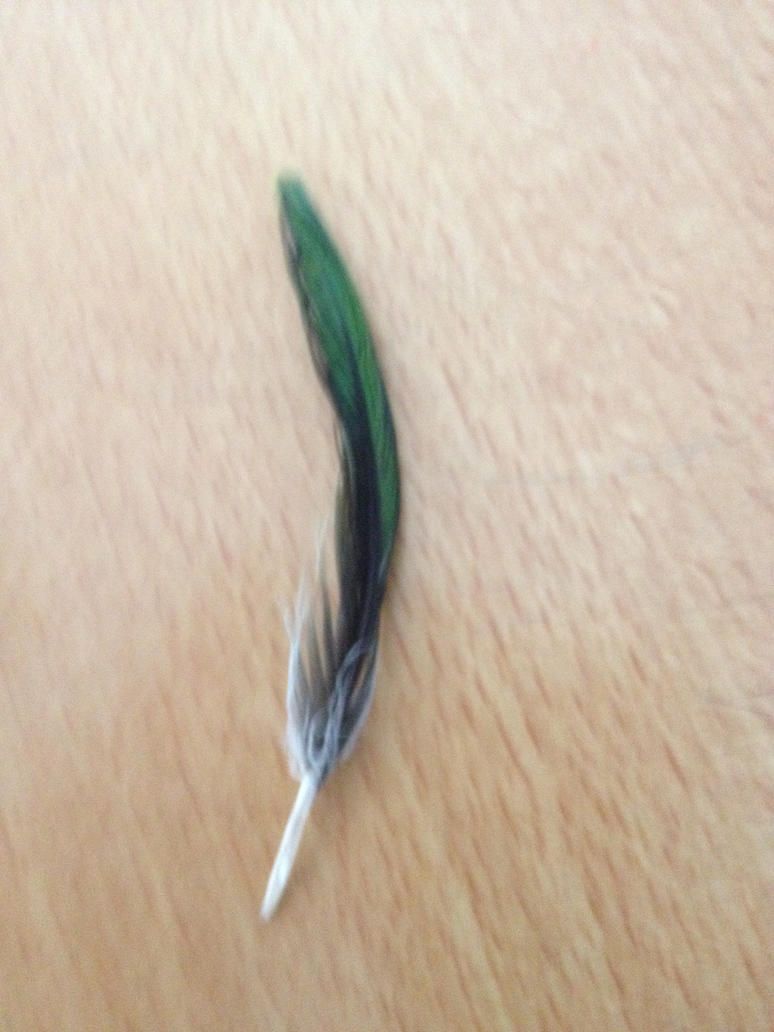
At the time I did not know this, and I was absolutely freaked out, the horrors of real people with real birds and real stories still fresh in mind.
Probably still a little shaken by a combination of this, I soon started to look for other "anomalies" that should not be there, and decided I found her beak to be a little "flaky". I have read that a flaky beak is nothing to be concerned of since it grows continiously, much like our nails, but some very light brownish discoloration still bugged me;
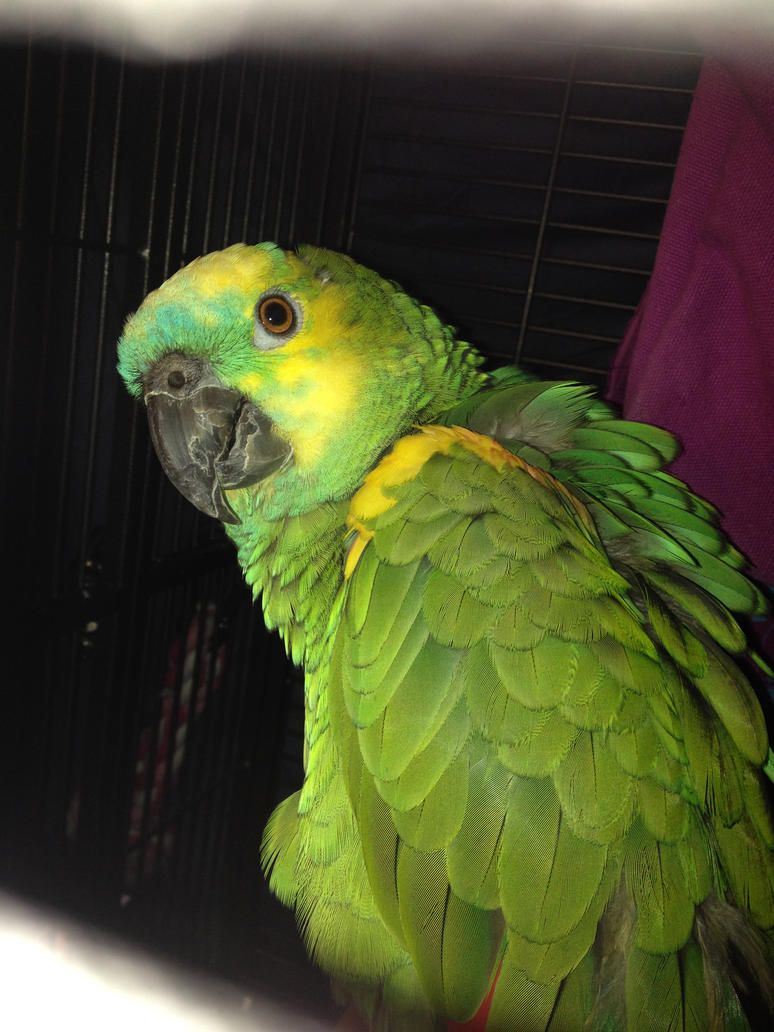
Since Kobus currently seems to be molting, and her grooming her feathers more than usually SHOULDN'T be much of a concern, I still felt that she would groom her feathers quite much, and especially her belly (of which I read some implications as well) would receive quite much of her attention.
Furthermore, I decided that showering regularly would at least ease her molting phase, and so I decided to increase the frequency of splashing her with a nice shower of spray water. I was amazed at the amount of down between her feathers, and I suddenly found myself questioning how normal THIS was, since I also read some stuff about THAT.
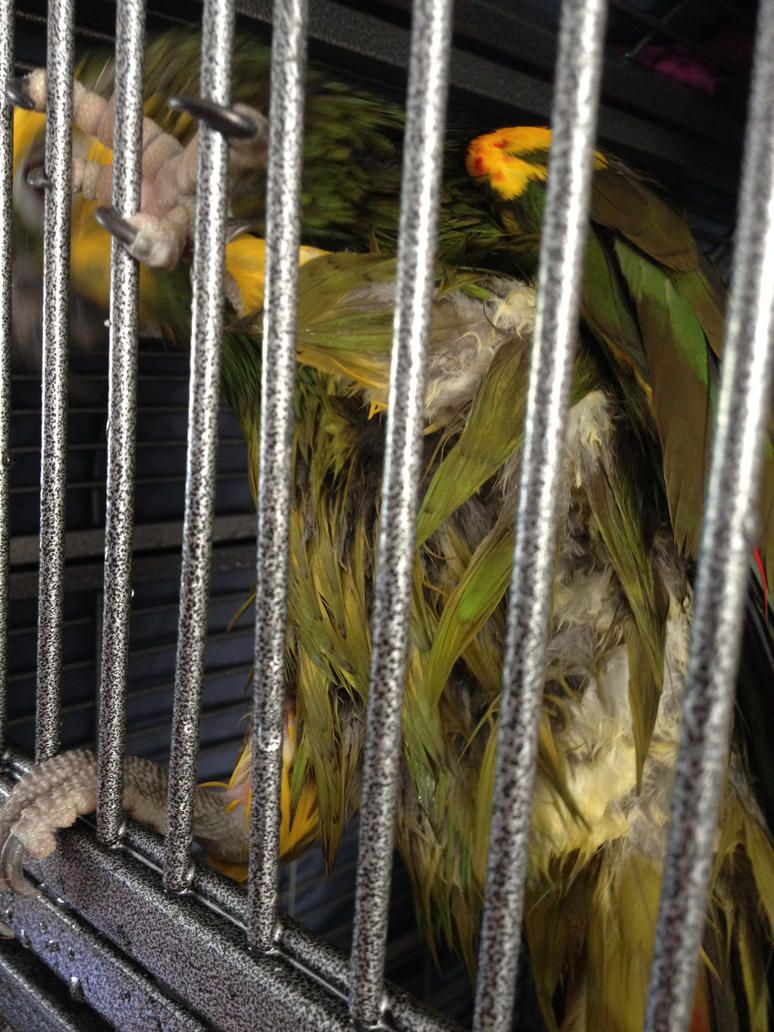
With her being absolutely soaked, it was a lot easier for me to see some new feathers, and I wondered if the little feathers growing from her legs were normal of shape, or would still "form fully" later.
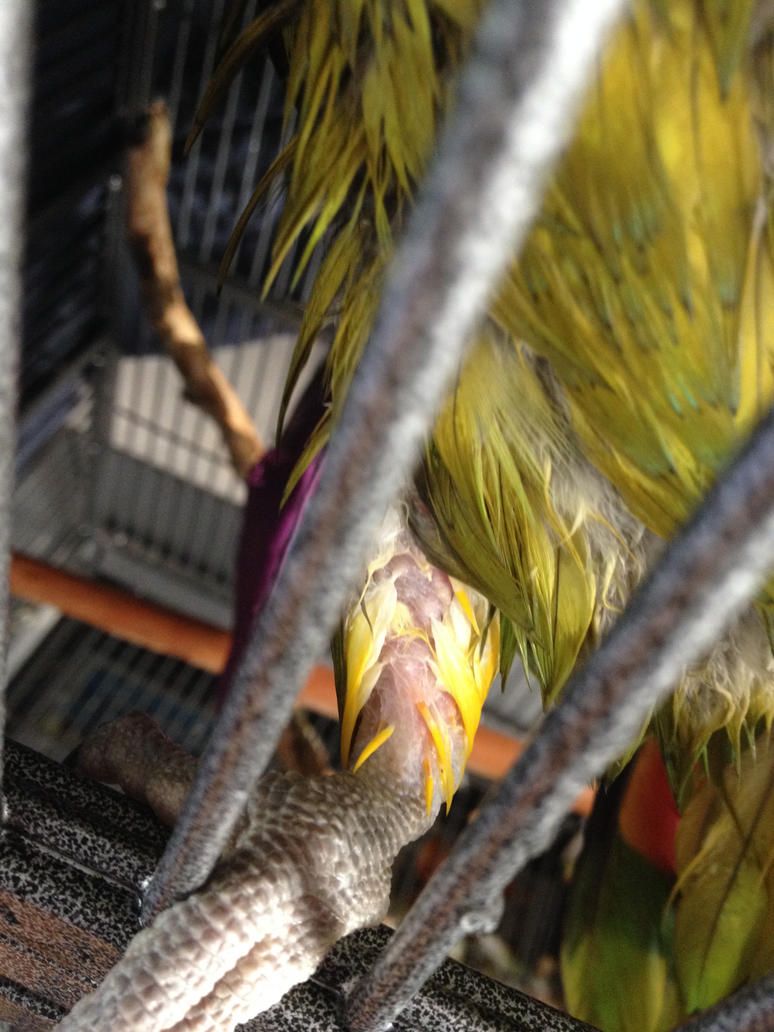
Kobus has dropped quite some feathers (not, I think, abnormally much, and quite evenly divided at that) and a big downy feather at her back catched my eye. When she flies, or when she spreads her wings sitting, you can really see her big "feathers" along with the pens, that make her plumage look a bit "scarce", nowhere bald, but those big white pens seem so lonely and uncanny..
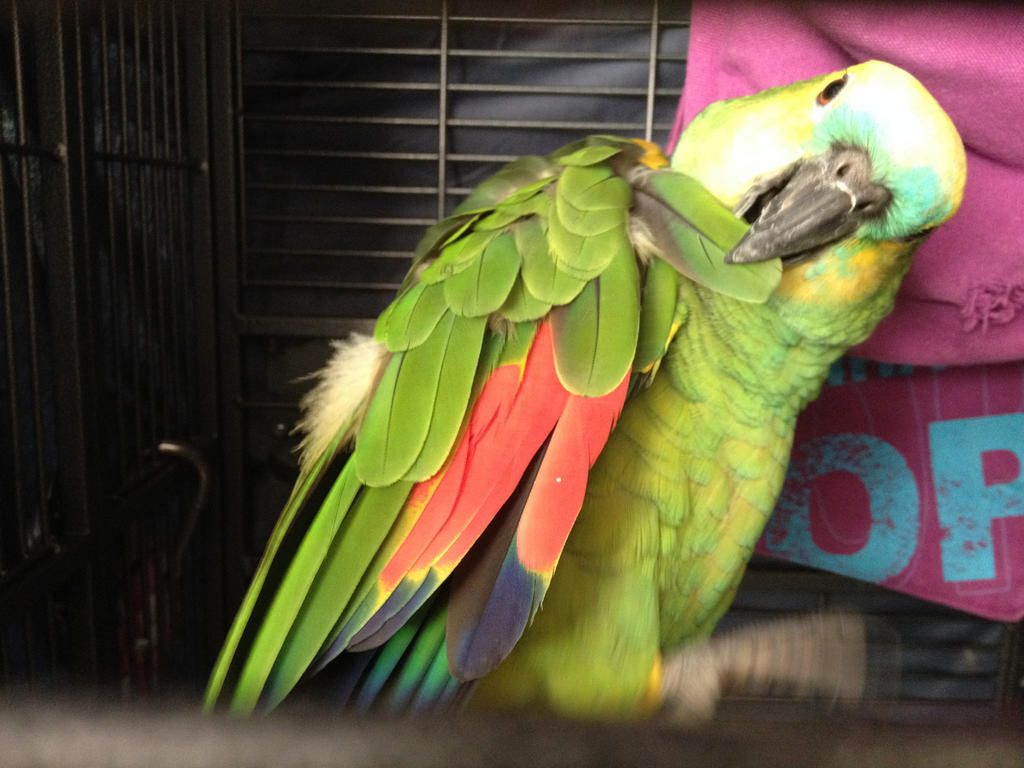
Since I tend to become overprotective of my loveables quite easily, I am sure I might be prone to some paranoid wild-goose-chasing, but after seeing how many kind and experienced people dwell on these forums, I realised the best way to get quality feedback (and hopefully calm my nerves) wasn't to look for scary stories and pictures on the internet and later comparing them to my own parrot, but instead posting my story, and pictures of my own parrot here! Am I worrying for nothing? Are there other visible signs of health concerns I should be aware of and should look after with dietary variations?
I stopped giving my parrot "just" regular food usually consisting of a mix of seeds, and mixing it up with cooked egg (as I read here!) to help her to regain and retain a healthy plumage, I already shared a lot of my fruit with her (she is especially bananas for bananas!) and also give her a daily dosage of veggies that she really likes anyways! I also add some vitamin drops to her water regularly, along with some additional drops meant to protect against infections some more.
I took Kobus to a pet store run by an expert on Amazon parrots that I remembered as a family friend when I was still a child, to make sure her nails weren't growing too long (who also told us that she suspected our Kobus might be a girl judgeing by her relatively slender shape at the time), but after discovering of this disease, I am pretty sure I will never take her to any other place that has or might have had other parrots or psittacines!
Thanks so much for your reactions!
(EDIT: And also sorry for the somewhat long post!)
I am 25 years old and have "owned" my fathers
 up until a year or 7 ago when it perished due to old age. My father, at the time, being a 15-year old son of an inlandskipper, traded his stamp collection with a Brazillian sailor for a, at the time still, adult
up until a year or 7 ago when it perished due to old age. My father, at the time, being a 15-year old son of an inlandskipper, traded his stamp collection with a Brazillian sailor for a, at the time still, adult  he called Kobus.
he called Kobus.My father, coming of age, met my mother and married her, and sadly, Kobus was left at the ship of my grandparents in a fight.
When my grandparents died, my father was not at good terms with them due to these personal circumstances, and my grandfather attempted to exclude him from his will.
This happened when my father was about 35. At the time, I was 7.
My father received a phonecall from a notary informing him of this, and also mentioning that my father, despite my grandfathers attempts to exclude him from his will, was to receive a rightful share of the inheritance.
My father refused, however, yet asked that if Kobus was still alive, he wanted the bird, since he never had the chance to take him back.
Kobus, roughly 20 years later, was still alive and kicking, and I was 7 when I saw my very first
 .
.Due to the long time passed, Kobus didn't recognise my father and was very hostile towards him. He would not be able to even come near to him, and would get attacked after even coming close.
From the get-go, however, I could pretty much approach him (gradually less) carefully, and grew into taking care of him.
This evolved into a longlasting friendship, and ever since Kobus died about 7 years ago, I have been missing the kind of company ol' Kobus would provide.
Last year in the August of 2013, a day before my birthday my girlfriends sister notified me that an old colleague of her was selling her bird, and it "really looked a lot like how I described my parrot".
I looked up the ad on the internet, and indeed found it to be a 4-year old
 named Kobus. I was, obviously, instantly in love, and got to pick (initially him, but we would later find out) her up the next day, on my birthday.
named Kobus. I was, obviously, instantly in love, and got to pick (initially him, but we would later find out) her up the next day, on my birthday.She has been living with us for nearly a year now, and I have already come to love her to death. It has been a little scary in the beginning, since it has been quite a while for me, handling a bird of this "calibre" and with the little lacks of confidences that come with now becoming an adult man with responsibilities.
Since I was "rediscovering" being owned by a parrot, I have been reading into a lot of health issues and ways to keep our little princess in tiptop shape.
Unfortunately, I sometimes read into something too much, and tend to get freaked out by possible diseases, illnesses and other dangers to the wellbeing of my feathered little friend.
I am afraid this was shortly after discovering the existence of the terrible disease that is PFBD, and I have read absolutely heartwrenching stories of people having to see their beloved companion suffer.
Coincidence had it that shortly after reading this story, I found a rather disturbing feather, wich I later discovered, with the help of my girlfriend, was just chomped on by our dog after our parrot dropped it.

At the time I did not know this, and I was absolutely freaked out, the horrors of real people with real birds and real stories still fresh in mind.
Probably still a little shaken by a combination of this, I soon started to look for other "anomalies" that should not be there, and decided I found her beak to be a little "flaky". I have read that a flaky beak is nothing to be concerned of since it grows continiously, much like our nails, but some very light brownish discoloration still bugged me;

Since Kobus currently seems to be molting, and her grooming her feathers more than usually SHOULDN'T be much of a concern, I still felt that she would groom her feathers quite much, and especially her belly (of which I read some implications as well) would receive quite much of her attention.
Furthermore, I decided that showering regularly would at least ease her molting phase, and so I decided to increase the frequency of splashing her with a nice shower of spray water. I was amazed at the amount of down between her feathers, and I suddenly found myself questioning how normal THIS was, since I also read some stuff about THAT.

With her being absolutely soaked, it was a lot easier for me to see some new feathers, and I wondered if the little feathers growing from her legs were normal of shape, or would still "form fully" later.

Kobus has dropped quite some feathers (not, I think, abnormally much, and quite evenly divided at that) and a big downy feather at her back catched my eye. When she flies, or when she spreads her wings sitting, you can really see her big "feathers" along with the pens, that make her plumage look a bit "scarce", nowhere bald, but those big white pens seem so lonely and uncanny..

Since I tend to become overprotective of my loveables quite easily, I am sure I might be prone to some paranoid wild-goose-chasing, but after seeing how many kind and experienced people dwell on these forums, I realised the best way to get quality feedback (and hopefully calm my nerves) wasn't to look for scary stories and pictures on the internet and later comparing them to my own parrot, but instead posting my story, and pictures of my own parrot here! Am I worrying for nothing? Are there other visible signs of health concerns I should be aware of and should look after with dietary variations?
I stopped giving my parrot "just" regular food usually consisting of a mix of seeds, and mixing it up with cooked egg (as I read here!) to help her to regain and retain a healthy plumage, I already shared a lot of my fruit with her (she is especially bananas for bananas!) and also give her a daily dosage of veggies that she really likes anyways! I also add some vitamin drops to her water regularly, along with some additional drops meant to protect against infections some more.
I took Kobus to a pet store run by an expert on Amazon parrots that I remembered as a family friend when I was still a child, to make sure her nails weren't growing too long (who also told us that she suspected our Kobus might be a girl judgeing by her relatively slender shape at the time), but after discovering of this disease, I am pretty sure I will never take her to any other place that has or might have had other parrots or psittacines!
Thanks so much for your reactions!
(EDIT: And also sorry for the somewhat long post!)
Last edited: